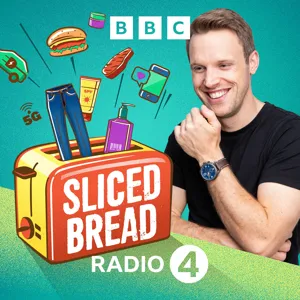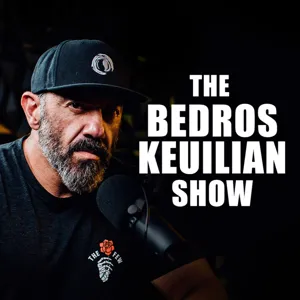Podcast Summary
Technology's Impact on Travel, Design, and Media: The Capital One Venture X Card offers travel benefits and unlimited miles, Canva presents efficient design solutions, and Tivo's introduction led to product placement as an alternative marketing strategy.
Technology continues to evolve and shape the way we consume media and work. The Capital One Venture X Card offers travel benefits and unlimited miles for every purchase, while Canva presents provide efficient solutions for various workplace needs. The introduction of Tivo marked a significant shift in media consumption, enabling viewers to skip commercials, leading to the rise of product placement as an alternative marketing strategy. Whether it's travel, design, or media, technology continues to innovate and transform our everyday experiences.
Balancing Product Placement in Media: Product placement in media can enhance a brand's image when done subtly, but it's crucial to avoid overt tactics to maintain audience trust. Three methods include organic placements, product trades, and financial compensation.
Product placement in media, be it audio or visual, requires a delicate balance. While it can be effective when executed well, it's essential not to be too overt to avoid backlash. Advertising executives play a crucial role in ensuring the product fits seamlessly into the production. There are three ways product placement occurs: organically, through product trades, or through financial compensation. Organic placements happen when a product ends up in a scene without the company's involvement. Product trades involve companies giving their products in exchange for placement, while financial compensation is when productions are paid for product placement. The most controversial method is financial compensation, which can be seen as extortion. While smaller films may resort to this, it's essential to remember that even with payment, filmmakers generally prefer their focus to remain on the story rather than the product.
Product Placement in Media: A Long-Standing Marketing Strategy: Product placement, where brands or products are promoted within films or TV shows, has been a common marketing tactic since the early days of cinema, offering mutual benefits to both industries.
Product placement, the practice of promoting a brand or product within a film or television show, has a long history and significant impact. Starting with the first known instance in "The African Queen" with Kate Hepburn and Gordon's Gin, it has evolved to become a common marketing strategy. Notable examples include Reese's Pieces in ET and the extensive use in soap operas. In some cases, like in Repo Man, the use of generic products can still equate to effective product placement. The costs of product placement can range from in-kind donations to substantial compensation. Regardless, it's a mutually beneficial arrangement that continues to shape the entertainment industry.
Product placement in media can increase brand visibility and sales: Unsolicited provision of props in movies and TV shows can lead to significant boosts in sales and recognition for companies, benefiting both large corporations and smaller businesses
Product placement in movies and TV shows can significantly boost a company's visibility and sales. In the case of the movie "Sid and Nancy," the tree air freshener company's unsolicited provision of props led to increased recognition and a reported 50% surge in sales for Red Stripe beer after its prominent display in the film. This phenomenon is not limited to large corporations, as smaller companies can also benefit from such exposure. For instance, the social media platform Zigazoo, which is popular among kids, has gained traction due to its safe and fun environment, certified privacy protections, and absence of negative commentary. Companies can leverage such opportunities to enhance their brand image and reach wider audiences.
Product placement in movies impacts brands' market presence and sales: Mention in a film can lead to increased distribution and sales for brands, but disputes over promised commercials can result in lawsuits.
Product placement in movies can significantly impact a brand's market presence and revenue. The example of the Squatty Potty bottle in "A Few Good Men" demonstrates how a simple mention in a film can lead to increased distribution and sales. However, things can go awry, as seen in the Jerry Maguire-Reebok controversy. Reebok reportedly paid $1.5 million for product placement in the film, but when a promised commercial was cut from the end, they sued for $10 million. The settlement likely included the commercial being added back in for cable and DVD releases. Product placement isn't limited to beverages or sports brands; cars are another common feature, with manufacturers often paying for their vehicles to be prominently displayed. For instance, Audi and Ford have had notable product placements in high-speed chase scenes. The practice of product placement has been around for decades, with early examples like the Ford Taurus in "RoboCop" preceding the car's official release. Overall, product placement is a powerful marketing tool that can lead to significant returns for both the film industry and the brands involved.
Media and cars: a powerful influence: Iconic movies and TV shows have shaped car preferences and desires through memorable representations, including specific models and brands.
Iconic movies and TV shows have significantly influenced the popularity of various cars throughout history. From "Herbie the Love Bug" boosting sales of the Volkswagen Beetle to Tom Cruise's Ray-Ban sunglasses and Ferrari 308i in "Risky Business," these media representations have left lasting impressions on audiences. Some cars, like the Audi RSQ from "I, Robot," were even created specifically for films, generating excitement and intrigue. Additionally, corporate sponsorships, such as Pepsi and FedEx, have further solidified the reputation of certain vehicles in pop culture. Overall, the relationship between media and cars is a powerful one, shaping preferences and desires for generations.
Product Placement Industry's Growth and Popularity: In 2006, $3.4 billion was spent on product placement in movies and TV, with reality shows being major recipients. Professionals handle placements, enhancing reality TV and reducing disbelief.
Product placement has become a significant industry, with corporations dedicating substantial budgets to have their products featured in movies and TV shows. In 2006, $3.4 billion was spent on product placement in movies and TV, with American Idol being a major recipient. Reality TV shows, in particular, have embraced product placement as a way to secure sponsorships and reduce production costs. Product placement is not limited to small, DIY efforts but has become a professionalized industry with entire teams dedicated to securing product placements. While some argue that it ruins the viewing experience, others see it as a way to enhance reality TV and reduce the need for suspension of disbelief. Tongue-in-cheek product placements, such as Wayne's World, have also become popular. Overall, product placement is a powerful marketing tool that allows corporations to leverage their brand at a granular level.
Product placement and sponsorship in modern media: Modern media integrates product placement and sponsorship through overt branding and safe platforms for kids, ensuring data protection and easy content discovery.
Product placement and sponsorship have become integral parts of various forms of media, from movies to sports and social networks. In the past, such integrations could be subtle or even problematic, as seen in the movie "State and Main" where a 19th-century film faced challenges with product placement from a modern office supply company. Today, sponsorships are more overt, with websites and even sports zones being named after the sponsoring brands. Social media platforms like Zigazoo have emerged as safe spaces for kids to engage in creative activities and share their work with others, while ensuring data safety through parental consent and video moderation. Meanwhile, services like THR charts help consumers navigate the vast amount of content available, making it easier for them to discover and watch popular shows and movies.
A history of product placement from songs to books and movies: Product placement has evolved from subtle mentions in songs to overt promotion in movies and TV shows. It's essential to distinguish between authentic and forced placements for a positive viewer experience.
Product placement has a long and varied history, from its earliest known example in a song, "Take Me Out to the Ballgame," to more modern examples in movies and television shows. One notable instance is Faye Weldon's "Bulgari Connection," a book commissioned by the jeweler for their highest-end clientele. However, not all product placements are equal. Some, like the Oreo Cookie Counting book, are educational and not explicitly promotional. Others, like the upcoming Windows 7 episode of The Family Guy, are entire episodes dedicated to promoting a product. To stay informed about upcoming product placements, there's even an industry website called productplacement.biz. But it's important to note that not all product placements are negative, and some can even be integrated seamlessly into the content. The key is to differentiate between authentic and forced placements.
Artists and Brands: A Mutual Benefit: Product placements in music can lead to mutual benefits for artists and brands, with personal stories often adding to the musicians' legends
There have been numerous instances in music history where artists have developed close relationships with certain brands, leading to product placements in their music and performances. For example, Busta Rhymes and Janis Joplin both had notable connections to Southern Comfort. In the case of Busta Rhymes, he was gifted a year's supply of the product after mentioning it in his song. With Janis Joplin, there are rumors that Southern Comfort bought her a mink coat and Rolls Royce as a result of her frequent on-stage consumption of their product. These examples showcase the power of product placement and the mutual benefits it can bring to both the artist and the brand. Additionally, the personal stories behind these connections often add depth and intrigue to the musicians' legends.
Unexpected encounters can lead to positive outcomes: Keep an open mind and be prepared for the unexpected as interactions can lead to positive outcomes, especially in communities where people share common passions.
Sometimes, unexpected encounters can lead to surprising outcomes. In the story shared, Uncle Matt, a car enthusiast, was pulled over by a cop while driving his Corvette in Kansas. Instead of giving him a ticket for speeding, the cop, who was also a car enthusiast, was more interested in the car and let Uncle Matt go with a warning. This unexpected turn of events resulted in a positive outcome for Uncle Matt. This story serves as a reminder that our interactions with others can be unpredictable, and sometimes, the unexpected can lead to something good. It's important to keep an open mind and be prepared for the unexpected. Additionally, the story highlights the passion and community surrounding car culture, where enthusiasts come together to share their love for cars.






